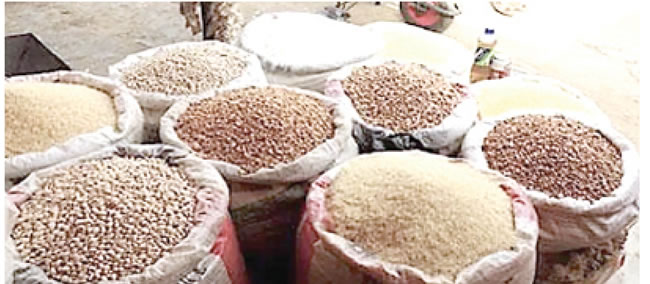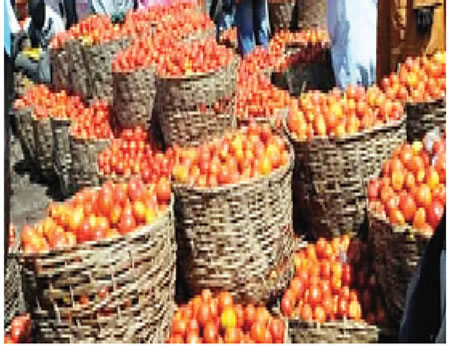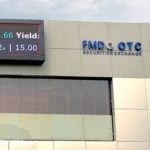The food blockade in some northern states triggered artificial scarcity and a temporary surge in some commodity prices in other parts of the country. CHIMA NWOKOJI in this report examines implications of the distortion in supply.
COMING at a time when Nigeria’s food inflation rose to the highest level since 2008 in January, the recent food supply blockade is a sad illustration of the crisis the nation’s food sector has faced, with millions of poor citizens struggling daily to buy food at exorbitant rates.
Although, Awwalu Aliyu, an official of the Amalgamated Union of Foodstuff and Cattle Dealers of Nigeria (AUFCDN) was quoted to have said the union preferred that farm produce go to waste rather than tolerate “continued attacks” on its members in the south, the Northern traders resolved to call off the blockade last week Wednesday.
Experts believe that the immediate impact of the food supply blockage is a rise in the cost of food items (Consumer Price Index) which measures inflation.
They frown at inflation because its cost on the Nigerian economy is already huge.
Inflation is an economic term describing the sustained increase in prices of goods and services within a period. To some, it signifies a struggling economy, whereas others see it as a sign of a prospering economy.
Inflation affects the purchasing power of citizens. As a consequence of the strike actions embarked upon by members of the Amalgamated Union of Foodstuff and Cattle Dealers of Nigeria (AUFCDN), not only were southerners pushed into difficult times, northern farmers also had their tales of woe.
As more and more farmers were looking for where to dispose their goods, they resorted to borrowing thereby raising the cost of funds; and while the blockade lasted, more people became unemployed in the agricultural value chain.
Food inflation climbed to 20.57 percent year-on-year in January 2021, according to data released by the National Bureau of Statistics, making it the highest in over 11 years. Before now, the highest level was in July 2008 and analysts are concerned that this trend might continue with its attendant costs to the economy.
Already, foremost economist, Mr Bismarck Rewane, and his team of experts at Financial Derivatives Company Limited have started tracking the costs.
“We expect the food and core sub-indices to move in tandem with the headline inflation. Food price pressures will remain the primary driver of inflation, rising to 21.98 per cent in February.
“The impact of the recent blockade of food supply from the Northern states to the south-west is unlikely to reflect in the February inflation numbers. However, the impact will be felt in the month of March. Core inflation (inflation less seasonality) is also projected to cross the 12 per cent threshold to 12.02 per cent in February due to exchange rate,” the experts said in an emailed note to Nigerian Tribune.
According to them, Nigeria’s headline inflation is estimated to increase sharply by 0.80 per cent to 17.27 per cent in February 2021.
“If this happens, it will be the highest level in 46 months. It is worth mentioning that inflation is not only moving further away from the upper band of the CBN’s six to nine per cent target, it is likely to impede output growth,” the analysts stated.
Although, analysts blame the rise on COVID-19 pandemic disruptions, dollar shortages and lingering restrictions on imports of certain food items despite the reopening of the borders, another major factor is the incessant attacks on farmers as well as recent blockade of food supplies which caused shortages of goods.
A leader in Oja Oba Market, Alhaji Hakeem Igbalaye, was quoted as having said that since the blockade, prices of food items had increased tremendously.
He said the implication of the blockade if it continues would be disastrous for the common man who cannot afford the exorbitant prices of food items.
According to the NBS, prices of food items increased the most in Kogi, Oyo, and River States in January when compared to January 2020. The three states recorded 26.64, 23.69, and 23.49 per cent respectively.
Wilson Erumebor, a senior economist at Nigerian Economic Summit Group (NESG), told newsmen that another reason for the rise could be high level of insecurity. Lack of good storage facilities must have led to the increase in the inflation rate we are experiencing,” he said.
“It appears a lot of local commodities traders are increasingly scared of moving goods from one location to the other due to the fear of getting killed and a lot of farm settlements have been damaged by either flood or conflicts,” he said.
An economist and former banker, Mr Damian Duke, said the food supply chain disruption was already causing steady rise of prices for goods and services and eroding purchasing power or how much of something that can be purchased with naira.
According to him, because inflation erodes the value of cash, it encourages consumers to spend and stock up on items that are slower to lose value.
On February 18, this year, the leadership of the union wrote to the Federal Government demanding the protection of its members, payment of N475 billion compensation for the lives and properties of members lost during the #EndSARS protest in October last year and the recent Shasha market crisis in Ibadan, Oyo State. The group also demanded the dismantling of all roadblocks on federal highways, alleging that their members were being harassed and money extorted from them by the security operatives
As of last Wednesday, the prices of food items remained high in markets in Lagos State despite the fact that the Federal Government a truce had been reached with the Amalgamated Union of Foodstuff and Cattle Dealers of Nigeria.
Investigations by Nigerian Tribune in Ikotun Egbe Market and Oshodi Lagos revealed that while prices of the food items were high, some items had not been available in the market since last weekend.
The prices of items such as onions, tomatoes, yam, beans, beef, carrot, Irish potato, cabbage and apple, among others, increased by over 100 per cent.
For instance, a basket of tomato, which was sold at between N5, 000 and N6, 000 before the strike, rose to between N14, 000 and N15, 000 while one kilo of beef cost N2, 000 as against N1, 000. A ‘painter’ of beans that was sold at N1, 200 before the blockade now cost N1, 800, while small tubers of yam that cost N800 before was sold at N1, 000. An apple that normally cost N60 now goes for N100 while a sizable watermelon cost between N500 and N700.
YOU SHOULD NOT MISS THESE HEADLINES FROM NIGERIAN TRIBUNE
Cryptocurrency: Understanding The Craze, Threat
ON Friday, February 6, the Central Bank of Nigeria (CBN) rocked the boat with a circular that inadvertently highlighted how popular cryptocurrency transactions have become among Nigerians in recent years, judging by…
ICYMI: Yoruba, Hausa Teachers Needed In US
The US Embassy and Consulate in Nigeria has announced that the services of Yoruba and Hausa teachers are needed in the United States. According to the Public Affairs Section of the US Mission Nigeria…
Controversy Over Man Who Jumped From 7th Floor Of 1004 During EFCC Raid
The police in Lagos State have begun investigations into the circumstances surrounding the alleged death of a man at 1004 Estate, Victoria Island, who allegedly jumped from the 7th floor of one of the buildings. The man was…
INEC Lists Five Challenges Ahead Of 2023 Elections
AS politicians step up horse-trading ahead of subsequent elections, the Independent National Electoral Commission (INEC) has listed five main areas of likely challenges…
After Two Years, Daddy Freeze Apologises To Bishop Oyedepo
Daddy Freeze whose real name is Ifedayo Olarinde has apologised to Bishop Oyedepo who is the presiding bishop and founder of Living Faith Church aka Winners Chapel…







